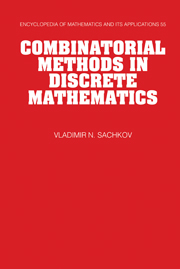2 - Transversals and permanents
Published online by Cambridge University Press: 22 March 2010
Summary
A wide range of the so-called combinatorial problems of choice can be reduced to finding a system of distinct representatives for a given family of subsets of a set. In what follows, such a system will be called a transversal. We prefer this term because it is short and so has an advantage over the corresponding, more detailed, conventional term. The main questions considered in this chapter are related to the existence and number of transversals. The basis for the answers to the first series of questions is an existence theorem due to P. Hall, and various applications of it. To determine the number of transversals, a notion of a permanent is used which is a modification of the well-known notion of a determinant playing an important role in algebra.
The theorem of P. Hall is the basis for the proofs of the theorem of M. Hall on the existence of Latin squares and rectangles and Birkhoff's theorem on the representation of a stochastic matrix as a weighted sum of permutation matrices. Birkhoff's theorem is connected with a number of assertions about the decomposition of probabilistic automata and Markov chains with doubly stochastic matrices of transition probabilities.
Transversals
The main theorems
Let X be an arbitrary, generally speaking, infinite set; let X1, …, Xn be a family of subsets of X containing, in general, infinite subsets. Note that the equalities Xi = Xj for i ≠ j are allowed. We denote this family by (Xi: i ∈ I), where I = {1, …, n}.
- Type
- Chapter
- Information
- Combinatorial Methods in Discrete Mathematics , pp. 49 - 101Publisher: Cambridge University PressPrint publication year: 1996

